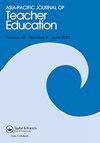Critical race self-study: an abolitionist methodology
IF 1.6
3区 教育学
Q2 EDUCATION & EDUCATIONAL RESEARCH
引用次数: 0
Abstract
ABSTRACT Taking an oppositional approach to the whiteness of teacher education research, I challenge critiques of self-study in teacher education as insufficient for the fundamental transformation of teacher education. Drawing from critical race theory, I posit that the stories and self-studies of Black, Indigenous, and other teacher educators of Colour are key to dismantling the white supremacy ingrained in teacher education. Race has palpable consequences for teacher education, and I posit that if teacher education research continues to sidestep and ignore race and racism, the field will continue to condone the harmful status quo of whiteness. Critically examining the need to move beyond research that naturalises whiteness in teacher education, I consider how “passing” and “trespassing” – the long-established positionings rendered possible to Black, Indigenous, and other teacher education researchers of Colour – are hindering the pursuit of racial justice. Seeking to expand the possible positionings of Black, Indigenous, and other teacher education researchers of Colour theoretically and methodologically, I propose critical race self-study as an abolitionist methodology with the potential to foster much-needed transformation for and through teacher education research.批判性种族自学:废奴主义方法论
摘要:我对教师教育研究的白人化持反对态度,对教师教育自学不足以实现教师教育根本变革的批评提出质疑。根据批判性种族理论,我认为黑人、原住民和其他有色人种教师教育者的故事和自我研究是消除教师教育中根深蒂固的白人至上主义的关键。种族对教师教育有着明显的影响,我认为,如果教师教育研究继续回避和忽视种族和种族主义,该领域将继续容忍白人的有害现状。在批判性地审视超越教师教育中白人自然化研究的必要性时,我认为“通过”和“非法侵入”——黑人、土著和其他有色人种教师教育研究人员长期以来的定位——是如何阻碍种族正义的追求的。为了在理论和方法上扩大黑人、土著和其他有色人种教师教育研究人员的可能地位,我建议将批判性种族自学作为一种废奴主义方法,有可能促进教师教育研究的急需转变。
本文章由计算机程序翻译,如有差异,请以英文原文为准。
求助全文
约1分钟内获得全文
求助全文
来源期刊

Asia-Pacific Journal of Teacher Education
EDUCATION & EDUCATIONAL RESEARCH-
CiteScore
4.40
自引率
7.70%
发文量
29
期刊介绍:
This journal promotes rigorous research that makes a significant contribution to advancing knowledge in teacher education across early childhood, primary, secondary, vocational education and training, and higher education. The journal editors invite for peer review theoretically informed papers - including, but not limited to, empirically grounded research - which focus on significant issues relevant to an international audience in regards to: Teacher education (including initial teacher education and ongoing professional education) of teachers internationally; The cultural, economic, political, social and/or technological dimensions and contexts of teacher education; Change, stability, reform and resistance in (and relating to) teacher education; Improving the quality and impact of research in teacher education.
 求助内容:
求助内容: 应助结果提醒方式:
应助结果提醒方式:


